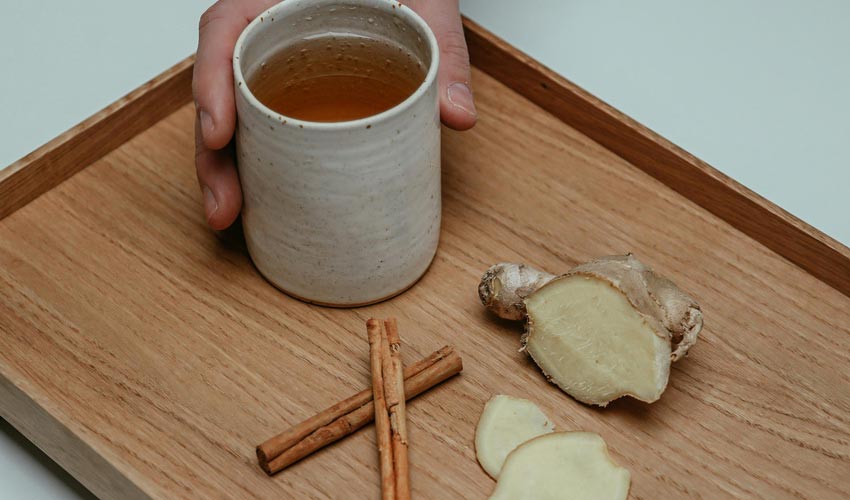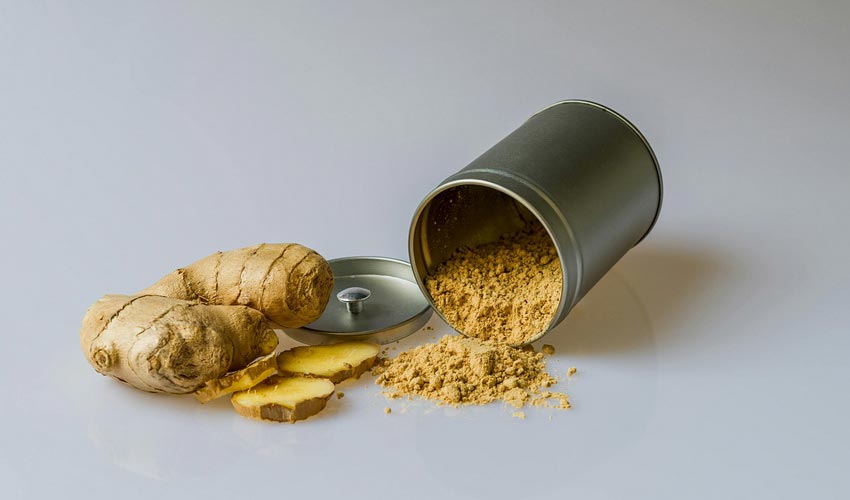The Numerous Evidence-Based Health Benefits of Ginger Unveiled
I have an insatiable passion for Ginger! It can be found abundantly at the local fresh food markets in Chiang Mai, and I always opt for the fresh variety for its intense spiciness. As a lover of all things spicy, the more heat, the better! Luckily, my wife is a whiz with fresh Ginger in her repertoire of recipes. Not only is Ginger a culinary delight, but its remarkable health benefits are truly astounding. Studies have shown that Ginger is more powerful in fighting staph infections than antibiotics, and all without the unwanted side effects. With the power to eradicate cancer cells, renowned anti-inflammatory properties, and the ability to address brain and gut issues, including ulcerative colitis and acid reflux, Ginger stands out as a truly remarkable herb. And if that wasn't enough, it can also help mitigate the effects of gamma radiation. What's not to adore about this extraordinary plant medicine?
Ginger, a staple in kitchens worldwide, has been utilised for its incredible flavour and medicinal properties for centuries. Although commonly known for its ability to calm the stomach, the uses of Ginger go far beyond that. The rhizomes of the Ginger plant, particularly Zingiber officinale, contain compounds like shogaol, zingerone, and gingerols, which have been linked to various health benefits. These compounds are akin to capsaicin found in chilli peppers, which is renowned for its pain-relieving properties. However, as history has shown us with other natural remedies, isolating and extracting a single component from a plant tends to diminish its overall effectiveness and eliminates the synergistic effects of its other components. This highlights the importance of harnessing the power of Ginger in its whole form to maximise both its positive effects and minimise any potential negative impacts.

The information presented in this article is based on studies that have focused on isolating individual ingredients, typically in the pursuit of developing pharmaceutical drugs. While this approach can yield results, the history of pharmaceuticals has shown that it is presumptuous to think we can enhance nature, and misguided to believe that extracting a single chemical won't result in the loss of vital natural components that help counteract negative effects. Nevertheless, these studies do validate the potent medicinal properties of Ginger.
The Health Benefits of Ginger
Let's explore the various ways in which Ginger can positively impact our health:
- Cancer: Numerous studies have revealed ginger's remarkable power in combating various types of cancer cells, including the most resilient and challenging to treat such as lung, ovarian, colon, breast, skin carcinoma, prostate, and pancreatic cancer.
- Prevention of Diabetes: Research indicates that diabetes can be prevented and managed effectively, with the additional benefits of reducing blood sugar levels, cholesterol, and blood fats.
- Natural Antibiotic: Emerging research suggests that Ginger's antibiotic properties may be remarkable. A recent study comparing the effectiveness of Ginger and antibiotics against Staphylococcus aureus and S. pyreus infections reveals promising results, indicating Ginger extract's potential superiority. While its impact on drug-resistant infections remains unexplored, Ginger has demonstrated antibacterial effects on respiratory and periodontal infections.
- Antifungal: Dealing with fungal infections can present a formidable challenge, especially with the rise of drug-resistant strains. Yet, there is hope on the horizon as Ginger has been discovered to possess potent antifungal properties, even against resistant forms.
- Ulcers: Ginger may hold the key to preventing intestinal ulcers. Recent research has shed light on the connection between the notorious Helicobacter pylori bacterium and ulcer formation. Remarkably, studies indicate that a derivative of Ginger can effectively inhibit the growth of H. pylori. Moreover, evidence suggests that Ginger not only prevents ulcer development but can also aid in healing existing ulcers. Embracing the power of Ginger could be a game-changer in gastrointestinal health.
- Diabetes Complications: Ginger is emerging as a promising ally in managing the complications of diabetes. Research indicates that this potent root may help significantly reduce protein levels in urine, minimise both water intake and urine output, and even reverse the troubling condition of proteinuria. Furthermore, Ginger acts as an aldose reductase inhibitor, a mechanism that mitigates the damage caused by diabetes-related metabolic processes. Its protective properties extend to safeguarding nerve health and lowering harmful blood fat levels, making Ginger a compelling addition to any diabetes management plan.

- Anti-Inflammatory Properties: Inflammation poses a significant threat to our health, playing a pivotal role in the onset of numerous chronic conditions and the pain that accompanies them. Enter Ginger, a powerful natural ally in combating this issue. Research suggests that Ginger's remarkable ability to inhibit the production of nitrous oxide and pro-inflammatory cytokines may offer valuable support for neurodegenerative diseases. Furthermore, its potent anti-inflammatory properties hold promise for managing arthritis, preventing cancer, addressing prostate disease, and alleviating various inflammatory processes.
- Gastric Distress: Ginger stands out as a remarkable remedy for gastric distress, offering more than just pain relief. In a double-blind study, participants suffering from dyspepsia, characterised by delayed gastric emptying, were given Ginger capsules. The results were impressive: Ginger effectively stimulated the emptying of the stomach without any adverse side effects. Additionally, its antispasmodic properties provide further insight into its positive impact on the intestinal tract. Ginger also plays a crucial role in inhibiting H. pylori, a bacteria linked to ulcer formation, and offers protective benefits to the gastric mucosa.
- Toxicity: Ginger stands as a powerful ally in safeguarding health against a variety of harmful substances. This remarkable root has demonstrated its ability to counteract the toxic effects of several compounds, including the pesticide lindane, the cancer treatment doxorubicin, the chemical bromobenzene, and the excitotoxin monosodium glutamate (MSG). Research reveals that when added to the diets of rats, ginger effectively mitigates oxidative stress caused by the neurotoxin lindane. Furthermore, doxorubicin, a widely used cancer drug, is known to pose significant risks to kidney health, yet Ginger has shown promise in alleviating this damage. Bromobenzene, a highly toxic chemical employed in industrial reactions, can severely impact the liver and nervous system, but studies indicate that Ginger can help protect against its deleterious effects on liver function. Additionally, Ginger extract has been found to offer protection against nerve damage induced by MSG. With its impressive array of protective properties, Ginger emerges as a potent ally in combatting the harmful effects of various environmental toxins.
- Non-Alcoholic Fatty Liver: Non-alcoholic fatty liver disease (NAFLD) is gaining attention as its incidence rises, largely driven by the widespread use of fructose as a sweetener. While research into Ginger's potential benefits for NAFLD is still in its infancy, preliminary findings suggest a compelling link. This condition is often connected to dyslipidemia and elevated triglyceride levels in the liver, challenges that Ginger might help address by reducing serum cholesterol. Fresh research published this year offers exciting insights into this possibility, though it remains early and not yet conclusive. Nonetheless, Ginger appears to show considerable promise as a potential therapeutic ally in the fight against NAFLD.
- Heartworms in Dogs: Dirofilaria immitis, commonly known as heartworms, pose a significant threat to our canine companions. Traditional treatments for this prevalent infection carry considerable risks, often leading to severe neurological issues and circulatory failure. Alarmingly, resistance to these conventional therapies is on the rise. Fortunately, nature offers a promising alternative: Ginger has emerged as an effective remedy against heartworms. Initial trials involving Ginger extract injections have shown remarkable results over a treatment period of 55 days, with an impressive average reduction of 83% in heartworm presence with some cases reporting up to a staggering 98%. While approximately half of the treated dogs displayed mild lethargy early in the process, this is likely a sign of their bodies working to eliminate the parasites rather than a detrimental side effect. This innovative approach harnesses the power of nature, providing hope in the ongoing battle against heartworm infections.

- Painful Menstruation: In a rigorous double-blind study, researchers evaluated the effectiveness of Ginger powder capsules against mefenamic acid (the non-steroidal anti-inflammatory drug marketed as Ponstel), ibuprofen, and a placebo in young women experiencing menstrual pain. Remarkably, Ginger emerged as a powerful contender, demonstrating efficacy comparable to both mefenamic acid and ibuprofen. This finding highlights Ginger's potential as a natural alternative for alleviating menstrual discomfort.
- Radiation: With radiation making headlines recently, it's exciting to discover that Ginger could play a vital role in protecting against its harmful effects. A recent study highlights Ginger's potential in alleviating nausea and taste distortion caused by radiation poisoning. In a compelling experiment, researchers administered high doses of Ginger extract to mice prior to their exposure to gamma radiation, contrasting them with a control group that received only distilled water. The results were striking: the Ginger-treated mice experienced significantly reduced symptoms and mortality rates, effectively shielding them from gastrointestinal and bone marrow-related fatalities. Intriguingly, however, treatment administered after exposure showed no protective benefits, emphasising the importance of preventive measures.
- Gout, Rheumatoid Arthritis, Knee Osteoarthritis & Indomethacin: Indomethacin, a widely used anti-inflammatory medication, is frequently prescribed to alleviate the pain associated with conditions like gout, rheumatoid arthritis, and knee osteoarthritis. However, emerging studies reveal a compelling alternative: Ginger extract. Research consistently demonstrates that Ginger is at least as effective as indomethacin, and in some cases, it outperforms this conventional treatment. Given that indomethacin carries a significant risk of adverse effects including renal insufficiency in 40% of patients, jaundice in 10%, headaches in 12%, and elevated liver function tests that signal possible liver damage, one must question the rationale behind its continued prescription. With such potential for serious side effects, it seems prudent for healthcare providers to consider Ginger extract as a safer and equally effective alternative in managing inflammation-related pain.
- Motion Sickness & Nausea: Ginger's remarkable ability to combat nausea has been extensively researched, solidifying its reputation as a natural remedy for various conditions, including motion sickness and sea sickness. Scientific studies have not only confirmed its effectiveness but have also delved into the mechanisms behind its soothing properties. For many women, morning sickness can be an overwhelming ordeal during the first trimester of pregnancy. In a compelling trial, pregnant women experiencing nausea were given Ginger-infused beverages and their results were compared to those who received a placebo. Remarkably, a substantial percentage of the women reported significant relief from their nausea thanks to Ginger. Moreover, in a separate study focusing on post-chemotherapy care, participants who consumed Ginger alongside protein found they could decrease their reliance on anti-emetic medications. This underscores Ginger's powerful potential as a natural ally in alleviating nausea and improving quality of life in challenging situations.
- Bacterial Diarrhoea: In developing countries, bacterial-induced diarrhoea stands as the leading cause of death among young children. Interestingly, it’s not the bacteria themselves that are directly responsible, but rather the harmful toxins they release. Zingerone, a natural compound found in ginger, emerges as a beacon of hope by binding to these toxins and preventing them from wreaking havoc in the gut, thereby averting diarrhoea and its potentially fatal consequences. The current standard of care relies on antibiotics alongside electrolyte replacement, a combination that suggests limited effectiveness of antibiotics alone. Given the known detrimental long-term effects of antibiotics and their high costs, it’s difficult to justify the lack of large-scale trials exploring the use of ginger for children suffering from bacterial diarrhoea. The potential for a safe, affordable, and effective treatment is too significant to overlook.
Isn’t it remarkable? The breadth and intensity of ailments that Ginger can alleviate is truly astonishing, and its effectiveness often surpasses expectations. Perhaps it's time for modern medicine to pause and reflect on how it veered so far off course. When we resort to pharmaceuticals that are often less effective and fraught with side effects, instead of exploring natural remedies like Ginger first, it becomes clear that we’ve taken a misstep.

Ginger’s Adverse Effects
When it comes to enjoying the benefits of Ginger for personal use, there are two standout options: ginger extract and ginger tea. While you can easily purchase ginger extracts, keep in mind that they come in two forms, water-based and alcohol-based. For many herbs, water-based extracts are sufficient; however, when it comes to Ginger, the alcohol-based variety consistently outperforms its counterpart. If you’re looking to harness the medicinal power of Ginger, opt for the alcohol-based extract for maximum potency. On the other hand, Ginger tea is a delightful indulgence that many savour. While pre-packaged Ginger teas are widely available, they often lack the benefits of a fresh brew made at home. Crafting your own Ginger tea is simple and rewarding!
Here’s how: Start by peeling a cube of Ginger (about an inch in size) and slice it thinly or grate it. Boil the pieces in approximately 1½ cups of water for about 10 minutes. For an extra zing, consider adding a splash of lime or lemon juice. If you prefer a touch of sweetness, stir in some honey or stevia. Pour your creation into a cup and relish every sip! Remember, everyone's palate is unique, so feel free to adjust the amount of Ginger to suit your taste. This recipe is just a starting point; let your creativity flow and find the perfect brew for you! Here you can purchase Pure Ginger Powder.
Ginger is not just delicious. Gingerol, a natural component of ginger root, benefits gastrointestinal motility ― the rate at which food exits the stomach and continues along the digestive process. Eating ginger encourages efficient digestion, so food doesn't linger as long in the gut. – Johns Hopkins Medicine






















